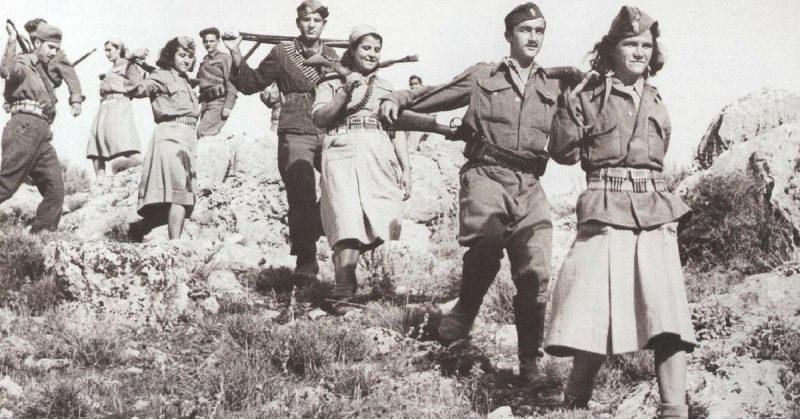War History Online Presents this Guest Blog From Alan G. Gauthreaux.
A highly motivated and extremely determined Greek army descended on communist guerrillas on three sides in the Grammos Mountains of northern Greece at the beginning of August of 1949. Showing no signs of capitulation and although confronted with American advisors and up-to-date weapons, the communist guerrillas fought desperately in a tactical retreat to their havens in Albania, just across the northern border of Greece. With the likes of the spitfire and Harvard warplanes igniting the skies with incendiary and napalm bombs, the rebels’ escape routes disintegrated and made it difficult for them to reach their mountainous sanctuaries in Yugoslavia and Albania. In a three-phase operation that would encompass almost the entire Greek army within the month of August 1949, General Thrasyvoulas Tsakalatos dedicated himself and his men into forcing the capitulation of the communist rebels. Standing on the precipice of total victory over the insurgency, Greek democratic forces felt confident in the eminent defeat of communism in Greece, ending a decade-long struggle that forced the people to submit to unbearable acts of oppression and brutality at the hands of patriots to the Soviet sphere of influence.
The communist insurgency was the second “occupation” in ten years for the Greek people and any respite from the treatment doled to them by the Nazis may have been considered welcome. The Nazis invaded and then occupied Greece in September of 1941, due to its strategic importance in protecting the southern flanks as the German army engaged Soviet Russia. The Greek government in power under King George II retreated into exile to Cairo, Egypt, taking along with it the remnants of its army and navy. The National liberation Front, also known as the EAM, followed the Soviet precedent against fascism and won overwhelming non-communist support amongst the population of the country. From the EAM, their armed faction, the ELAS, managed to recruit more than 60,000 members to combat the Germans and fight in small guerrilla units. While the guerrillas harassed the Germans in Greece, in February of 1943, Greek army and naval forces in the Middle East rebelled against King George II and his cabinet after rumors of British support for restoration of the monarchy after the war spread amongst them. The Greek soldiers and sailors, mostly sympathetic to the communists, demanded a National Unity government, bringing together the communists, the government-in-exile, and the progressive movement known as the Political Committee of National Liberation. The British worried that the Soviets would push for more influence in appointing itself as Greece’s protector in Britain’s stead.
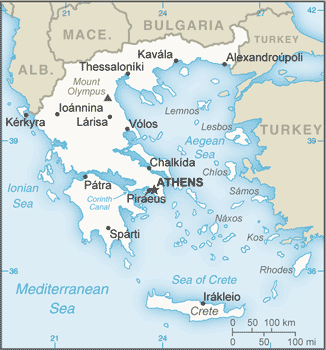
The British military subsequently quelled the rebellion and imprisoned over eight thousand officers, citing a dereliction of duty. By late 1944, Greek communist guerrillas overran the country. Once the Germans withdrew from the country, the communists now looked to play an active role in governing Greece. Although the relationship between the Soviet Union and the Allies brought victory over the Axis in World War II, the new policies needed development to peacefully coexist with the Soviets and their satellites, while at the same time preventing any further spread of the communist ideology. Greece would prove to be an integral part of that policy and with the withdrawal of German forces, this predicated the conflict between political ideologies precipitating the Cold War. The events that occurred in Greece between 1933 and 1949 repeated themselves in various countries throughout the world in the post-war period as the United States and the Soviet Union vied for power through proxy arrangements and insurgency, always ending with the diplomatic niceties of détente, only with numbers of dead and wounded.
In October of 1944, elements of the German army evacuated Greece when they realized the guerrilla turned against them and the Germans were needed elsewhere to preserve weakening Nazi fronts in Western and Eastern Europe. The ELAS and royalist Greek guerrillas joined together under British command and a coalition government. The Moscow leadership urged the guerrillas to use restraint and through an accord known as the Caserta Agreement, the guerrillas agreed not to take the law into their own hands, and all guerrilla units should join into partnership, no matter their ideology, to defeat the common enemy — the Germans. British Lieutenant General Ronald Scobie (more of an administrator than battlefield commander) took command of the combined forces, much to the disappointment of the Soviet leadership.
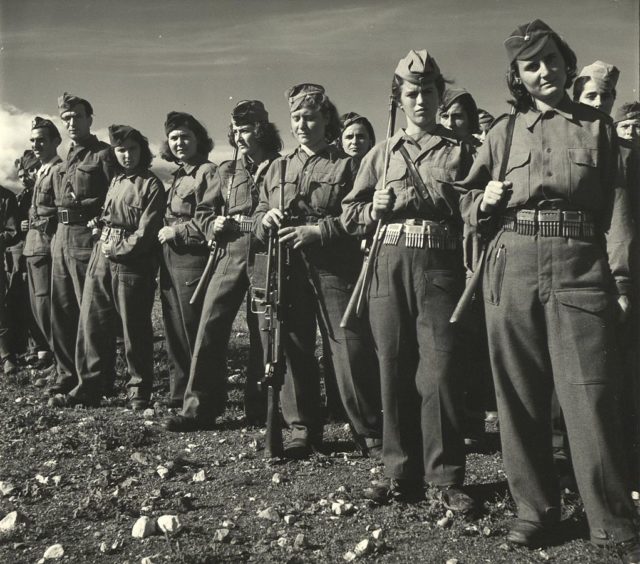
A British expeditionary force arrived in late November 1944, but communist insurgents, angered by what they considered to be another foreign army takeover, incited an uprising in Athens on December 3, 1944, in violation of the Caserta Agreement, resulting in over four thousand deaths. When the uprising finally ended three months later, to evade reprisals and/or prosecutions, the remaining communist forces fled to the border countries of Albania, Yugoslavia, and Bulgaria. The uprising concluded the “Varizka Agreement” in February 1945, which saw the temporary disbanding of the communist forces within Greece’s borders. Because of the chaos brought on by the distrust of both sides, Greece functioned primarily under an unstable (at best) government and any leadership up to the point could unite the factions into an agreeable alliance.
Add to the fragile agreements between the warring factions, economics began to play an integral part in the Greek civil war. Great Britain had already borne the brunt of the financial burden in defeating the Nazis in Greece, and entering into another protracted struggle, especially with the communists with the backing of the Soviet bloc, would insure financial ruin for the empire and guarantee the British a seat where they would helplessly watch the “Iron Curtain” as it descended around them. Greece needed a stronger benefactor and, in fact, a great democratic power to stem the tide of Soviet influence in the Mediterranean. Because of foreign policy concerns and the desire for the United States to lead the way in the war against communism, President Harry S. Truman took up the democratic cause as he later stated, “It was our policy to strengthen the weak spots in the defense of the free world.” President Truman realized in the fall of 1945 that the Soviets must not be allowed to gain control of the Turkish Straits, including Greece, and if they succeeded, could easily turn the western flanks and take control of the rich oil fields in the Middle East.
President Truman realized in the fall of 1945 that the Soviets must not be allowed to gain control of the Turkish Straits, including Greece, and if they succeeded, could easily turn the western flanks and take control of the rich oil fields in the Middle East.
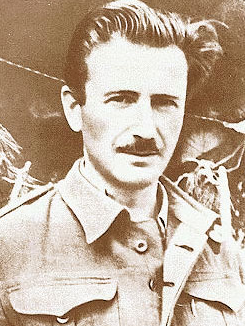
Even with the promise of American aid and no further action on the part of the communist insurgents according to Varizka Agreement, until any American assistance would arrive, the situation grew steadily worse in Greece as means of export could not be utilized for economic purposes, inflation ran rampant, and in the spring of 1946, the military situation became dire when the democratic and communist factions resorted to street fighting and political assassinations in the cities, and guerrilla warfare in Macedonia. Additionally, ex-ELAS members formed another group to wreak havoc in the post-occupation period. Known as the Democratic Army of Greece (DAG), their new commander, General Markos Vafiadis, known as “Gen. Markos,” was a seasoned ELAS veteran and operated his newly assembled force from a base inside Yugoslavia.
With the omnipresent threat of communist takeovers in war-torn nations around the globe, President Truman realized that the United States must intercede or Greece would fall to the communists. Therefore, he called upon Army Chief of Staff General George C. Marshall and Undersecretary of State Dean Acheson to formulate a policy providing Greece with the aid needed an all-out military commitment to defeat the insurgency forces there. President Truman presented a speech to a joint session of Congress on March 12, 1947, where he strongly conveyed that, “wherever aggression, direct or indirect, threatened the peace, the security of the United States was threatened.” President Truman also apprised Congress of the economic conditions, public health concerns, and terrorist activities Greece underwent since the departure of the Germans. Republicans became concerned that any assistance to Greece at this point with the primary purpose of defeating the communists would be interpreted as a tacit declaration of war between the United States and the Soviet Union. Despite the opposition, President Truman signed a bill into law on May 22, 1947, granting aid to Turkey and specifically, to Greece.
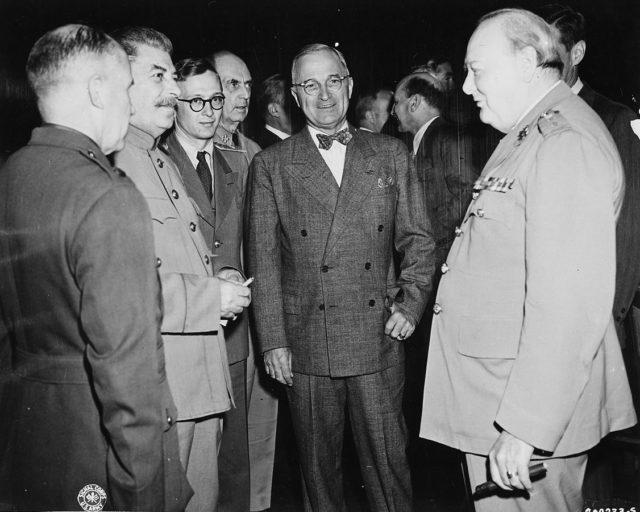
With a major infusion of American aid soon to arrive, the communist insurgents in Greece remained undeterred. Momentary concerns now focused on a transformation of the Greek army itself. General Alexander Papagos, a well-respected and seasoned veteran of the war against the Germans, was promoted to overall commander of the Greek army. Through this existence, Gen. Papagos immediately realized the need to retrain his officers in unconventional warfare and eliminate the rampant incompetence that plagued his country’s military leadership for so long. The general designed the National Defense Corps to protect lesser populated yet “sensitive areas” of the country, allowing the main Greek army to concentrate on the effective elimination of guerrilla units where they bastioned in the hills of the Greek countryside. The reforms took effect immediately, but the “new” Greek army would take almost two years to prove their mettel against the insurgents.
On April 4, 1948, the new Greek army moved against rebel entrenchments on Mount Mourgana which stood between the Greek and Albanian borders. According to U.S. military advisor, Lieutenant Colonel Thomas G. Fleming, he observed the Greeks pushing the rebels across the Albanian border but failed to push the attack itself. With the terrain suited best for unconventional warfare, the Greek infantrymen soon collapsed due to physical exhaustion. Learning from his army’s lack of aggressive fortitude, Lt. Gen. Papagos also purged politically unreliable and inept officers, made infantry units more mobile by lightening their equipment, gave soldiers better food, and formed elite commando units more capable of engaging an elusive enemy.
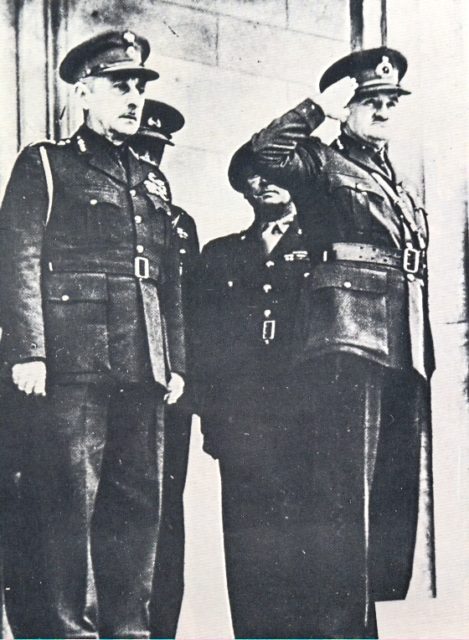
On April 15, 1948, communist guerrillas chanting anti-American slogans raided the town of Kalavryta (once decimated by the Germans as well during the war) of all foodstuffs, looted, and then kidnapped some of the male population away to the northern mountains for indoctrination.
With the long-awaited arrival of American aid and some military advisors in the spring of 1948, the reconstituted Greek army began offensives against rebels in the mountains of their northernmost borders in a stuttered opportunity to end the civil war. On April 15, 1948, near the small town of Roumeli, the Greek army attacked communist strongholds in the Mournos River Valley. The guerrillas tried desperately to organize a defense against 30,000 government troops supported by heavy artillery that rained fire down upon the enemy and prevented them from escaping the valley. Reports from the battle quickly surfaced that some of the rebels who escaped the onslaught made their way to a short distance outside of Athens. Government statistics put the rebel losses at between 1,000 and 1,500 active combatants during the twelve-day battle.
With the onset of the snow season in the mountains, on August 1, 1948, the Greek army continued their attack on rebel bastions near Mount Grammos where artillery fire cascaded continually on the rebel positions at 5,148 feet elevation, trapping them with enough time so that government troops could seize the town of Tambouri. In overwhelming the rebel forces, the Greek army sought to divide the insurgent army in the Smolika from the rebel forces in the Grammos range. After this engagement, American and British advisors strongly suggested a change in battlefield command as a new combat strategy needed to be implemented in order to close the door on the rebel operations. The Greek premier announced the replacement of the former commander with Lieutenant General Stylianos Kitrilakis who immediately took command of the northern front in the Grammos Mountains.

The desperation of the guerrillas became apparent as on August 12, 1948, a reservoir a few short miles from the inland town of Arcadia was destroyed by rebel saboteurs dressed as indigenous sheep herders. This attack followed a resolute order given over the radio that the rebels needed to be more aggressive with their methods to disrupt any democratic infrastructures. As a result of the sabotage and knowing that the guerrillas used the refuge of border nations sympathetic to their cause, the United Nations Special Committee on the Balkans met in Athens to strongly recommend a resolution that Yugoslavia, Albania, and Bulgaria disavow any further aid and comfort to the communist guerrillas. This resolution proved of no import as the communist rebels continued being supplied with the necessary materiél from their benefactor nations.
The Greek army continued their clashes with the rebels on the northern Grammos front. The soldiers under the divisional command of General Thrasyvoulas Tsakatos rescued five hundred children, ranging in ages from 5 to 13, whom the rebels kidnapped and headed for camps in Albania. Certainly, most of these young children would have been subject to communist indoctrination to eventually increase the size of the rebel force when they came of age for combat.
The northern campaign continued through the Peloponnesus when, on August 23rd, the army reported it had captured the entire Grammos area. However, most of the rebels again escaped to the sanctuary of Albania. A little less than a month later, Gen. Markos fell wounded and rebel soldiers brought him to a hospital in Albania to convalesce. A stalemate then developed in the region and the Greek army would continually fight in the area for another year.
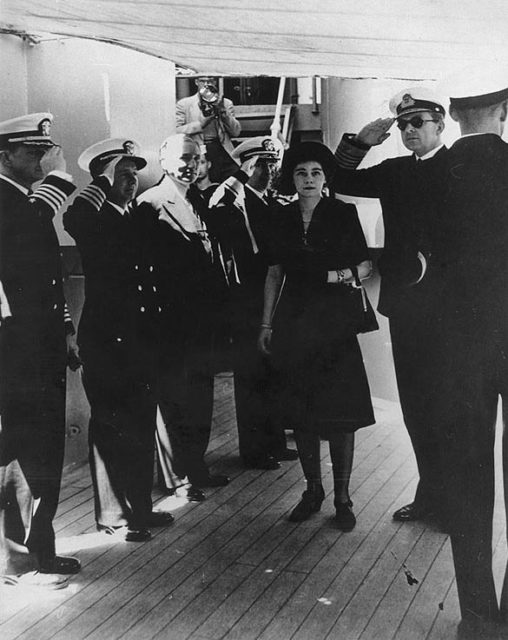
During the latter part of 1948, the communists suffered from political betrayals within their own realm. Within the last month of that year, Yugoslavia, under the military dictatorship of Marshal Tito, became embroiled in a rift with the powers in Moscow concerning the canceling of an economic treaty with Bulgaria. Tito felt betrayed and openly criticized Stalin for the slight. Stalin “excommunicated” the Yugoslavian leader from the Soviet sphere of influence. However, Tito still supported the guerrillas in Greece and they supported him, but if the rebels followed the party line in ostracizing Tito, supplies and ammunition would cease, in addition to threatening their safe havens in Yugoslavia. Even with the government forces containing the rebels within the confines of the Grammos and Vitsi mountain ranges, the quarreling amongst the communist hierarchy, and the uncertainty of maintaining their ideological focus, the civil war entered its fifth year.
In January of 1949, the communist guerrillas laid siege then captured the town of Naoussa, approximately ninety miles west of Salonika. After this small rebel victory, the Greek government made more changes in the military which they perceived would bring them closer to victory over the communists. One of the integral changes removed the army from under political control and influence, allowing commanders greater control troll the deployment of government troops. Because of this reassignment, now Field Marshal Papagos was promoted to commander-in-chief of the Greek armed forces. Subsequent to Gen. Papagos’ promotion, Gen. Markos, from his hospital bed somewhere in Yugoslavia (he had since been moved from somewhere in Albania), made peace overtures toward the Greek government in Athens. He demanded an armistice by evicting all foreign missions, both military and humanitarian, all foreign intervention ceased, and amnesty to be granted all political prisoners. The Greek government would not accept any peace overtures until either the Greek army annihilated all rebel resistance, or through unconditional surrender of all communist forces operating in Greece. Not long after these exchanges between the opposing forces, the communist “Free Radio” radio stated that Gen. Markos had been relieved of his duties and may had already died from the wounds he sustained in combat, but the Greek government in Athens could not confirm the general’s death as a certainty.
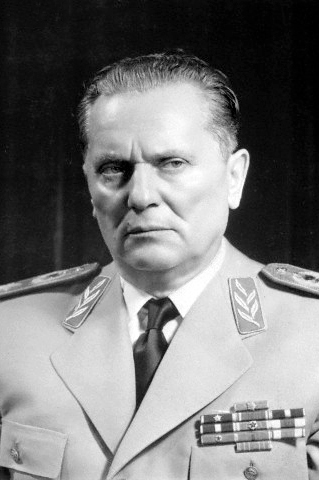
Until some sort of arrangement could be made for a ceasefire, battles continued all over northern Greece from the middle of February 1949, until September of that year. But the second and third phases of the operations in the Grammos Mountains found the guerrillas suffering heavy losses at places like Florina near the border of Yugoslavia and, again, government forces encountered and defeated the rebels in a three-day offensive at Mount Vitsi on August 10, 1949. The communist forces finally resigned themselves that their defeat loomed at the hands of the democratic government forces. During the three-phase offensive on the Mount Grammos valley, the communist rebels lost their tactical advantage when government forces seized the former’s last mountain stronghold on August 24, 1949.
Officially, although skirmishes continued sporadically throughout September and October of 1949, the Greek Civil War ceased at the end of the latter month. The rebels failed to gain the popular support of the people and because of the lack of that support, they could not live off the mountainous regions they chose as their command posts. Once they organized themselves into larger less mobile units, the guerrillas lost their element of surprise and speed of movement. Likewise, morale in the Greek army steadily improved with the aid and counsel of outside military advisors (specifically, American advisors) in developing successful strategy and tactics to fight an unconventional enemy. The continued rift between Stalin and Tito also deflected attention away from the communist “struggle,” forcing the infighting more to the forefront than supporting their brethren in the Greek civil war.
President Truman stated in his Memoirs that, “It was our policy to strengthen the weak spots in the defense of the free world,” and the United States did just that. The Truman Doctrine defined US foreign policy past the collapse of communism in the late 1980s, but also provided the groundwork for proxy wars in places such as Korea, Vietnam, and Afghanistan. One thing stood out from the Greek Civil War: without US intervention, the 700,000 casualties suffered would have been much worse. The collapse of any support from the Soviet sphere of influence was considered an integral facet of the complete defeat of communism in the Mediterranean. However, American advisors observed and received practical experience in counterinsurgency and the manner in which to train special operations groups from the various branches of the armed services. These lessons would prove invaluable as the United States and the Soviet Union would continue to fight over the “hearts and minds” of indigenous populations throughout the globe.
By
Alan G. Gauthreaux
